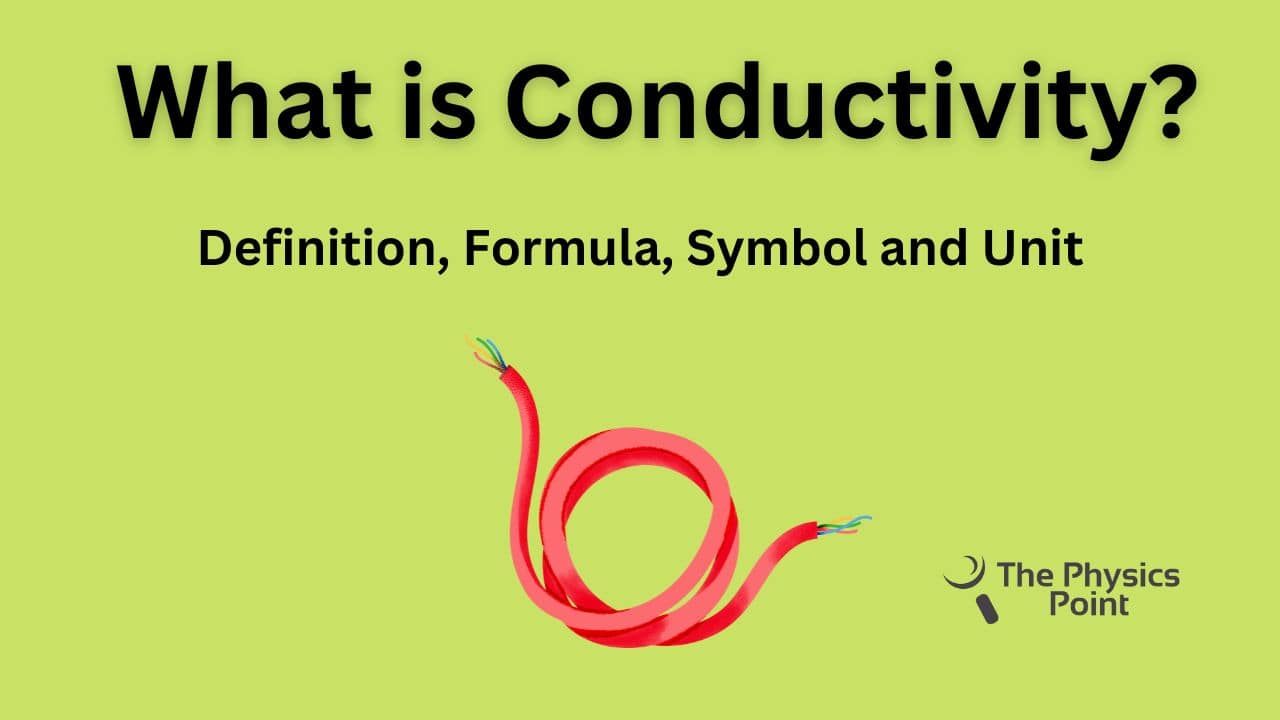What is Conductivity? Definition, Formula, Symbol and Unit

After the article on electric current we are presenting another important article related to electricity, what is conductivity? Hello, welcome to the website. how are you guys? I hope you are enjoying our article very much. In today’s article, we will tell you everything about conductivity. Everyone should know about conductivity and the factors that affect it. Without knowing its definition you will not know its value of it and its use. Here to full fill your mind with the concepts of Physics we will tell you about every possible thing about it. So you have to read this article from start to end to understand the concept of what is conductivity.
Some important questions from the exam point of view such as what is conductivity, electrical conductivity, the definition of conductivity, conductivity in science, what is the conductivity, electrical conductivity definition, conductivity formula, etc will be discussed in our today’s article. Dear people if you haven’t read our previous article on electric current, then you must go through the link below to read that article. So without wasting much time let’s start our today’s topic what is conductivity?
What is Conductivity (Definition)?
The term conductivity measures the capability of any material to pass the flow of electric current inside it. This conductivity varies from material to material which means, for different materials the conductivity is also different in other materials. The presence of protons and electrons is responsible for the current development. If any charge flows inside a material, it constitutes the electric current. Besides any solid material, the water also conducts the electric current but in only an impure state.
The conductivity is represented by the Greek letter σ. It is the inverse of resistivity.
The Unit of the conductivity = siemens per meter (S/m)

The formula for the conductivity
Given is the formula of conductivity-
Here,
- σ = electrical conductivity
- ρ = resistivity

What is specific conductance?
Specific conductance is a conductivity measurement done at 25 degrees centigrade and this is also known as a standardized method of measuring conductivity. As we know that water conductivity effects by temperature so at 25 degrees centigrade temperature conductivity is easy to measure the specific conductance is generally reported in µS/cm. & at the temperature of twenty-five degrees centigrade.
We can also say that if we measure the electrical conductivity at the temperature of 25 degrees centigrade is called the specific conductance another phenomenon is the temperature coefficient which is called when we measure the conductivity at different temperatures and correct it after it to the 25° centigrade. In the above we have told you what is conductivity?
List of Conductivity of Materials
What is conductivity? We have told you this above. Here, conductivity is expressed as a percentage of silver. where the 100% conductivity of silver is said to exist. However, the conductivity of silver varies from 97% to 100% depending on its purity.
|
सामग्री
|
चालकता (% में)
|
|
चांदी
|
97-100
|
| तांबा |
93-96
|
| सोना |
70
|
|
अल्युमीनियम
|
61 |
|
निकल
|
22 |
|
जस्ता पीतल
|
27
|
| पीतल |
28
|
| लोहा | 17 |
| टिन | 15 |
|
फॉस्फर कांस्य
|
15
|
| लेड | 7 |
| निकल अल्युमीनियम कांस्य | 7 |
| इस्पात | 3 से 15 |
SI Conductivity Unit
In the above we have told you what is conductivity? When discussing electrical conductivity, the SI unit of conductivity, known as siemens per meter (S/m) or mho, is usually represented by the Greek letter sigma, σ. Its formula is as follows.
Watts per metre-kelvin (W/(m K)) or watts per centimetre-kelvin (W/(cm K)) is the SI unit used to measure thermal conductivity. It is shown by the following formula:
K = QL/AΔT
where,
- K is the thermal conductivity in W/m K,
- Q is the amount of heat transfer through the material in J/s or W,
- A is the area of the body in m2
- ΔT is the difference in the temperature in K.
What is the conductivity of the water?
It is the extent to which water conducts or transmits electricity or the heat energy or sound inside the water is known as the conductivity of water. You should know that pure water has a conductivity equal to zero and it is also known as a bad conductor of electricity. When we talk about normal water it is said to have some types of impurities in the form of minerals. So normal water or drinking water is responsible for the conduction of the current. Sea water has the maximum value of conductivity with respect to any water.
The table is given below to understand the value of conductivity of different types of water –
| Different types of water | Their Conductivity Value |
| Pure distilled or Deionized water | 0.05 µS/cm |
| Seawater | 50 mS/cm |
| Drinking water or Normal water | 200 to 800 µS/cm. |
| The Rain or The snow water | 2 to 100 µS/cm |
The units of water conductivity are Simons per meter in SI units and millimhos per centimeter [mmho/cm] in US units.
What is an electrolyte?
The electrolyte is a substance that dissociates in the water in the form of iron and charged particles. The particles that possess a positive charge are called cations and the charge that possesses a negative charge are called anions. The simple definition of electrolyte is given as particles that are responsible for the conduction of electricity in the water is known as electrolyte. In the above we have told you what is conductivity?
Relation b/w conductivity and resistivity
First of all, we need to know what is resistance and resistivity. Resistance is the ability to oppose the electric current in any wire. We can say that resistivity is a property of the material that opposes the following electric current. And this property of the buyer or conductor is known as resistivity. The relation between conductivity and resistivity and the resistance is given by the formula which is given below-
- Here,
- R – resistance of the wire
- ρ – Resistivity or specific resistance
- l – Lenght of the wire
- σ – Conductivity
Frequently Asked Questions (FAQs)
Ques. What is electrical conductivity?
Ans. It is the measure of the ability of the metal or solution to pass the current inside it.
Ques. What is the effect of temperature on the conductivity of the water?
Ans. When we increase the temperature the conductivity of water also get increases.
Ques. What is the value of conductivity of distilled water?
Ans. The distilled water conductivity has the value of 0.05 µS/cm.
Ques. What is the value of the conductivity of drinking water?
Ans. The drinking water conductivity has the value of 200 – 800 µS/cm.
Ques. Which factor affects the conductivity of water?
Ans. There are three main factors that affect the conductivity of water-
- depend on the substance dissolves in water
- It depends on the temperature.
- The ions in the solution.
Conclusion
Dear people, we have talked about many things related to the what is conductivity article. Some important things such as the conductivity symbol, the definition of conductivity in science and physics, conductivity in physics, what is conductivity in physics, what is conductivity measured in, etc. Still now if you have any doubts or any queries related to the What is Conductivity article, you can comment below in the comment section below so that we can clear your doubts and queries very soon. Guys, stay tuned with us for other important physics articles. Thank you!

The next time I read a blog, I hope that it doesnt disappoint me as much as this one. I mean, I know it was my choice to read, but I actually thought youd have something interesting to say. All I hear is a bunch of whining about something that you could fix if you werent too busy looking for attention.